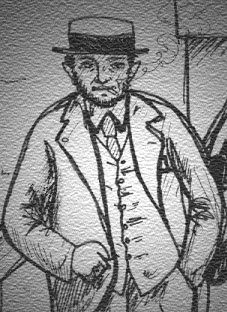
The lieutenant stood in front of the steel sphere and gnawed a piece of pine splinter. "What do you think of it, Steevens?" he asked. "It's an idea," said Steevens, in the tone of one who keeps an open mind. "I believe it will smash--flat," said the lieutenant. "He seems to have calculated it all out pretty well," said Steevens, still impartial. "But think of the pressure," said the lieutenant. "At the surface of the water it's fourteen pounds to the inch, thirty feet down it's double that; sixty, treble; ninety, four times; nine hundred, forty times; five thousand, three hundred--that's a mile--it's two hundred and forty times fourteen pounds; that's--let's see--thirty hundredweight--a ton and a half, Steevens; a ton and a half to the square inch. And the ocean where he's going is five miles deep. That's seven and a half--" "Sounds a lot," said Steevens, "but it's jolly thick steel." The lieutenant made no answer, but resumed his pine splinter. The object of their conversation was a huge ball of steel, having an exterior diameter of perhaps nine feet. It looked like the shot for some titanic piece of artillery. It was elaborately nested in a monstrous scaffolding built into the framework of the vessel, and the gigantic spars that were presently to sling it overboard gave the stern of the ship an appearance that had raised the curiosity of every decent sailor who had sighted it, from the Pool of London to the Tropic of Capricorn. In two places, one above the other, the steel gave place to a couple of circular windows of enormously thick glass, and one of these, set in a steel frame of great solidity, was now partially unscrewed. Both the men had seen the interior of this globe for the first time that morning. It was elaborately padded with air cushions, with little studs sunk between bulging pillows to work the simple mechanism of the affair. Everything was elaborately padded, even the Myers apparatus which was to absorb carbonic acid and replace the oxygen inspired by its tenant, when he had crept in by the glass manhole, and had been screwed in. It was so elaborately padded that a man might have been fired from a gun in it with perfect safety. And it had need to be, for presently a man was to crawl in through that glass manhole, to be screwed up tightly, and to be flung overboard, and to sink down--down--down, for five miles, even as the lieutenant said. It had taken the strongest hold of his imagination; it made him a bore at mess; and he found Steevens, the new arrival aboard, a godsend to talk to about it, over and over again. "It's my opinion," said the lieutenant, "that that glass will simply bend in and bulge and smash, under a pressure of that sort. Daubrée has made rocks run like water under big pressures--and, you mark my words--" "If the glass did break in," said Steevens, "what then?" "The water would shoot in like a jet of iron. Have you ever felt a straight jet of high-pressure water? It would hit as hard as a bullet. It would simply smash him and flatten him. It would tear down his throat, and into his lungs; it would blow in his ears--" "What a detailed imagination you have!" protested Steevens, who saw things vividly. "It's a simple statement of the inevitable," said the lieutenant. "And the globe?" "Would just give out a few little bubbles, and it would settle down comfortably against the day of judgement, among the oozes and the bottom clay--with poor Elstead spread over his own smashed cushions like butter over bread." He repeated this sentence as though he liked it very much. "Like butter over bread," he said. "Having a look at the jigger?" said a voice, and Elstead stood behind them, spick and span in white, with a cigarette between his teeth, and his eyes smiling out of the shadow of his ample hat brim. "What's that about bread and butter, Weybridge? Grumbling as usual about the insufficient pay of naval officers? It won't be more than a day now before I start. We are to get the slings ready to-day. This clean sky and gentle swell is just the kind of thing for swinging off a dozen tons of lead and iron, isn't it?" "It won't affect you much," said Weybridge. "No. Seventy or eight feet down, and I shall be there in a dozen seconds, there's not a particle moving, though the wind shriek itself hoarse up above, and the water lifts halfway to the clouds. No. Down there--" He moved to the side of the ship and the other two followed him. All three leant forward on their elbows and stared down into the yellow-green water. "Peace," said Elstead, finishing his thought aloud. "Are you dead certain that clockwork will act?" asked Weybridge presently. "It has worked thirty-five times," said Elstead. "It's bound to work." "But if it doesn't?" "Why shouldn't it?" "I wouldn't go down in that confounded thing," said Weybridge, "for twenty thousand pounds." "Cheerful chap you are," said Elstead, and spat sociably at a bubble below. |
|
